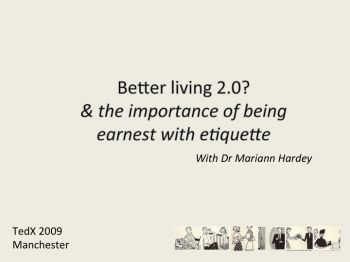TEDx Manchester 09 and the importance of being earnest with etiquette

Download this presentation (1.7 MB)
In 2009, I was thrilled to be asked by my favourite BBC bod Ian Forrester - he of BBC Backstage accolade - to 'do' a TED talk at BBC Manchester, for what turned out to be Europe's largest ever TEDx event.
Kudos indeed.
Stating the obvious?
Isaac Newton told us that when an apple fell from a tree it invariably headed towards the ground. Noam Chomsky told us we only make sense of the words of another person because we share a knowledge of the basic grammatical structure of language. Such things might seem obvious - especially when presented in a necessarily brief manner to an audience that does not share a common disciplinary background. I am a social theorist / deeep thinker when given the chance, and this means that, in common with others in my discipline, I seek to understand the social world that we all share.
We do this through theoretically informed empirical research. So yes - for some people parts or all of my presentation at the recent TEDx might be dismissed as trivial, uninteresting or boring (see Louise Bolotin's blog post Here's the Kicker for more). Such critics have every right to hold and broadcast their opinions. However, in so doing they are closing their minds to the possibility of understanding or as Max Weber (another social scientist - but rather more venerable and long dead) put it ‘verstehen' - by which (broadly) he meant to indicate that human interaction and society is so complex that it may be best understood through detailed description and interpretation.
It might be maintained that we ‘just get on with' our interactions across SNSs and so forth. My talk was not of a ‘how to' kind - as clearly for the audience at these events - Blogs, Twitter, Facebook and so on are part of everyday life. Like other social scientists (for example, Erving Goffman and more recently Anthony Giddens to name two) my concern is to ‘get under' the everyday and the often mundane taken-for-granted. Does this matter in our Web 2.0 world?
Yes - because as social life embraces or (according to some) moves ‘online' (a old fashioned label to some) it brings with it all the good and bad aspects of human behaviour. Indeed this shift may enhance or exaggerate and accelerate some forms of behaviour - we have all read reports of ‘cyber' bullying, relationships damage through SNSs ‘affairs' and so forth. More pragmatically, an understanding of how and why people move across social media will help in the design of better and sustainable resources. However, the study of such things is still in its infancy and conventional academic work struggles to keep up with the fast pace of change in social media. The media that you are immersed in and take-for-granted is strange, risky, fast, ephemeral and trivial to most of my academic and commercial colleagues.
My first TEDx proved to be an interesting experience - I'd like to thank my critics for their considered thoughts - I don't (yet) have a complete answer (but then I'm not as well established, prominent or well-rewarded as the ‘great men' mentioned above or the other participants at TEDx) - but your responses will feed into my research and the work on my book, ‘Encounters With. Social life in the network society', in which I am exploring the issues raised in my talk as well many others in appropriate depth.
